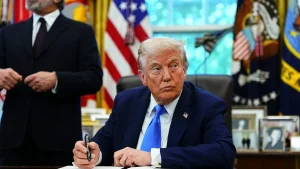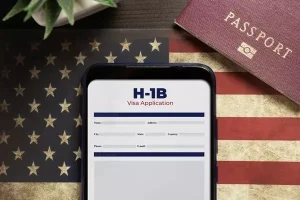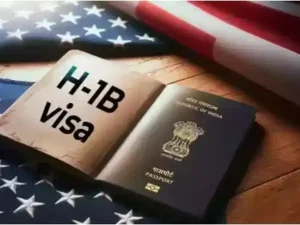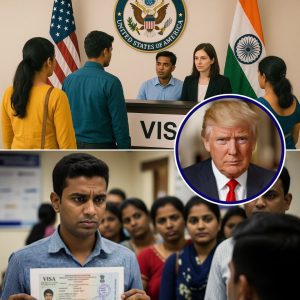Washington D.C. – A coalition of unions, employers, and religious groups has filed a federal lawsuit in San Francisco challenging President Donald Trump‘s order imposing a dramatic H-1B visa fee increase. The lawsuit represents the first legal challenge to Trump’s proclamation that raises the H-1B visa fee from a typical range of $2,000-$5,000 to an unprecedented $100,000 per application.
Background of Trump’s H-1B Visa Fee Order

The Trump administration’s new H-1B visa fee policy bars new visa recipients from entering the United States unless their sponsoring employer makes a one-time payment of $100,000. This represents a massive increase from the traditional H-1B visa fee structure that employers previously paid, creating significant financial barriers for companies seeking to hire foreign workers in specialty occupations.
The H-1B program allows US employers to hire foreign workers in specialized fields, with technology companies particularly dependent on workers who receive these visas. The dramatic H-1B visa fee increase could fundamentally reshape how American companies access global talent and maintain their competitive edge in innovation-driven industries.
Core Constitutional Arguments Against H-1B Visa Fee Hike


The plaintiffs argue that Trump’s H-1B visa fee order is fundamentally unlawful and exceeds presidential authority. According to the lawsuit, the President “has no authority” to unilaterally impose fees, taxes, or other revenue-generating mechanisms for the United States. The suit contends Trump cannot “dictate how those funds are spent” without congressional approval.
The lawsuit emphasizes that Trump “disregarded” constitutional limitations and “asserted power he does not have” when issuing the H-1B visa fee proclamation. “The Constitution assigns the ‘power of the purse’ to Congress, as one of its most fundamental premises,” the suit states, highlighting the separation of powers doctrine that reserves spending and taxation authority to the legislative branch.
Also Read: Critical: Trump Reacts to Hamas Hostage Release, Orders Israel to Stop Gaza Bombing
Claims of Unlawful Program Transformation
Beyond constitutional arguments, plaintiffs contend that Trump’s H-1B visa fee order fundamentally transforms the visa program established by Congress. The lawsuit argues that Trump “displaced a complex, Congressionally specified system for evaluating petitions and granting H-1B visas” through his executive action.
The dramatic H-1B visa fee increase forces employers into a “pay to play” system or alternatively requires them to seek “national interest” exemptions. According to the lawsuit, this exemption structure “opens the door to selective enforcement and corruption,” creating opportunities for arbitrary decision-making and potentially discriminatory application of immigration policy.
Coalition of Plaintiffs Challenging H-1B Visa Fee
The lawsuit brings together diverse stakeholders affected by the H-1B visa fee increase. Plaintiffs include the United Auto Workers union, the American Association of University Professors, the Justice Action Center, and the Democracy Forward Foundation representing the Global Nurse Force. Several religious organizations have also joined the legal challenge.
This broad coalition demonstrates the H-1B visa fee impact extends beyond technology companies to healthcare, education, religious institutions, and various sectors relying on specialized foreign talent. The diverse plaintiff group strengthens arguments that the policy affects fundamental American interests and institutions.
Procedural Violations in H-1B Visa Fee Implementation


The lawsuit challenges not only the substantive H-1B visa fee increase but also the process by which it was implemented. Plaintiffs argue that federal agencies, including the Department of Homeland Security’s US Citizenship and Immigration Services and the State Department, adopted new policies to implement Trump’s order without following necessary rulemaking processes.
According to the suit, agencies failed to consider how “extorting exorbitant fees will stifle innovation” before implementing the H-1B visa fee hike. This procedural argument suggests that even if the President had authority to increase fees, the implementation violated administrative law requirements for public notice, comment periods, and impact assessment.
Economic Impact of H-1B Visa Fee Increase
The lawsuit highlights potential economic consequences of the H-1B visa fee policy. The dramatic cost increase from $2,000-$5,000 to $100,000 per visa creates substantial financial barriers for employers, particularly smaller companies and startups that cannot absorb such expenses. This H-1B visa fee structure could force companies to relocate operations overseas or abandon projects requiring specialized expertise unavailable domestically.
The innovation sector particularly depends on global talent pipelines that the H-1B visa fee increase threatens to disrupt. Technology companies, research institutions, and healthcare facilities have historically relied on these visas to fill critical skills gaps and maintain competitive advantages in rapidly evolving fields.
Trump’s Immigration Restriction Agenda
The visa fee increase represents part of Trump’s broader initiative to restrict immigration to the United States. This first lawsuit challenging the proclamation may establish precedent for addressing other executive actions targeting immigration programs. Legal experts anticipate the outcome could influence future presidential authority to modify immigration policies unilaterally.
Implications for Foreign Workers and Employers


The lawsuit outcome will significantly affect foreign workers seeking opportunities in the United States and American employers depending on international talent. A successful challenge could restore previous fee structures and reaffirm congressional authority over immigration policy. Conversely, if courts uphold Trump’s order, employers must fundamentally restructure hiring strategies and budgets.
Conclusion: Constitutional Showdown Over Immigration Authority
The lawsuit presents fundamental questions about presidential power, congressional authority, and immigration policy. As the case proceeds through federal courts, stakeholders across industries await resolution of whether executive orders can unilaterally transform congressionally established programs through dramatic fee increases that effectively function as prohibitive barriers to legal immigration.

